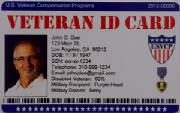|
|
|
HomeNDCOnline CoursesASVAB PracticeUSAF PDG TestsUSVCP StoreDischarge CertificatesVeteran Directory2016 Comp RatesSMC RatesEmergency Data CardVeteran ID CardLuggage ID CardDisabilitiesBusiness DirectoryVerify ServiceBenefits NewsComp QuestionsCompensation NewsHow to WinVet CentersVSO DatabaseVA Regional OfficesState BenefitsSVC CompensationCompensation FAQsAgent OrangePsych CompMST CompensationRare CompensationLocate War BuddyMedical RecordsStressor LettersFormsBrochuresFREE GuidesVideosPress ReleasesContact UsMembershipUpcoming EventsDiscountBizArchive RecordsHomeless AlertSubmit ArticleVSO of the YearClassifiedsAbout USVCP
|
Proposes Adding 5 Diagnosable Illnesses Secondary to Service-Connected TBI WASHINGTON – The Department of Veterans
Affairs is publishing a proposed regulation in the Federal Register that would change its rules to add five diagnosable illnesses
which are secondary to service-connected Traumatic Brain Injury (TBI). “We
must always decide Veterans’ disability claims based on the best science available, and we will,” Secretary of
Veterans Affairs Eric K. Shinseki said. “Veterans who endure health problems deserve timely decisions based on solid
evidence that ensure they receive benefits earned through their service to the country.” VA proposes to add a new
subsection to its adjudication regulation by revising 38 CFR 3.310 to state that if a Veteran who has a service-connected
TBI also has one of the five illnesses, then the illness will be considered service connected as secondary to the TBI. Service connection under
the proposed rule depends in part upon the severity of the TBI (mild, moderate, or severe) and the period of time between
the injury and onset of the secondary illness. However, the proposed rule also clarifies that it does not preclude a Veteran
from establishing direct service connection even if those time and severity standards are not met. It also defines the terms
mild, moderate, and severe, consistent with Department of Defense (DoD) guidelines. Comments on the proposed rule will be accepted
over the next 60 days. A final regulation will be published after consideration of all comments received. VA’s decision is based on a report by the
National Academy of Sciences, Institute of Medicine (IOM), “Gulf War and Health, Volume 7: Long-Term Consequences of
TBI.” In its report, the IOM's Committee on Gulf War and Health concluded that "sufficient evidence of a causal
relationship" - the IOM's highest evidentiary standard - existed between moderate or severe levels of TBI and diagnosed
unprovoked seizures. The IOM found "sufficient evidence of an association" between moderate or severe levels of
TBI and Parkinsonism; dementias (which VA understands to include presenile dementia of the Alzheimer type and post-traumatic
dementia); depression (which also was associated with mild TBI); and diseases of hormone deficiency that may result from hypothalamo-pituitary
changes. Specific
information about the Defense and Veteran Brain Injury Center is available at http://www.dvbic.org/. Information about Gulf War and VA's services and programs are available at: http://www.publichealth.va.gov/exposures/gulfwar/hazardous_exposures.asp. # # # See your
VSO for details or call 800-827-1000 today. |
|
|
|
|
|
|

